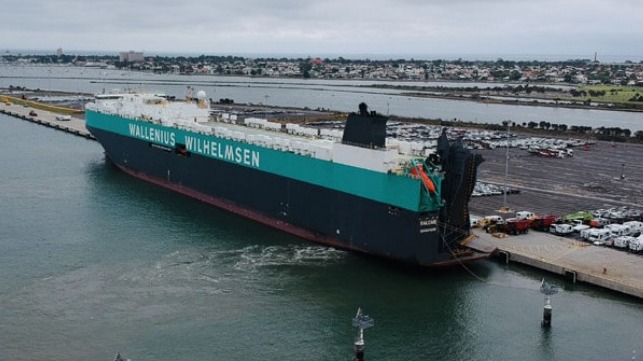Wallenius Wilhelmsen Contracts for Biofuel Supply from ExxonMobil

Wallenius Wilhelmsen, a Norwegian shipping giant known for its fleet of vehicle carriers, reports it has secured a supply of biofuel to help it begin the next step in its efforts toward reducing emissions and promoting eco-friendly practices. It is the latest in a series of transitional steps, including efforts at slow steaming as the company also develops plans for the world's first wind-powered RoRo vessel.
The company reports it is teaming up with ExxonMobil in a sustainable biofuel supply deal. They have contracts for the delivery of biofuel used as a drop-in blend to enhance the environmental performance of the fleet. The first biofuel delivery is scheduled for July, marking what the company calls the beginning of a transformative journey toward decarbonization. Wallenius Wilhelmsen's strategic goal calls for achieving a net-zero emissions integrated supply chain service by 2027.
“The biofuel from ExxonMobil contains 30 percent biofuel and 70 percent conventional fuels. It is the best option we have available for decarbonization of the fleet today,” says Jon Tarjei Kråkenes, head of the Orcelle Accelerator at Wallenius Wilhelmsen. “While the contracted volume represents a relatively small portion compared to our annual fuel consumption, it serves as a crucial step in our broader sustainability efforts and sets the stage for further progress."
According to the company, as the demand for eco-friendly alternatives continues to grow, partnerships like this one demonstrate the industry's dedication to fueling change. Through such initiatives, the shipping industry is reshaping its practices to reduce its carbon footprint and drive positive environmental impact.
Last week, the company highlighted additional efforts at EUKOR and WW Ocean toward greener shipping. They reported receiving an award for their participation in the Vessel Speed Reduction (VSR) program, an innovative initiative by South Korea's Ministry of Oceans and Fisheries. The VSR program encourages reduced ship speeds in designated Sea Areas to decrease particulate emissions from ocean-going vessels.
The company reports that more than 90 percent of its fleet, or a total of 162 out of 182 vessels, has participated in the VSR program at the ports of Gwangyang, Ulsan, and Incheon. They have been involved in the initiative since it started in December 2019. The result contributed to a significant 5.3 percent reduction in GHG emissions and a 5.7 percent decrease in fine dust. Wallenius Wilhelmsen reports it is exploring the possibility of reaching a 100 percent participation level in the VSR program.
No comments:
Post a Comment